FCC Drafting Order to Approve Charter-Time Warner Cable Deal
16 March 2016 - 1:18PM
Dow Jones News
By Shalini Ramachandran and John D. McKinnon
Federal Communications Commission Chairman Tom Wheeler is likely
to circulate a draft order as soon as this week approving Charter
Communications Inc.'s $55 billion deal to buy Time Warner Cable
Inc. with certain conditions, according to people familiar with the
matter.
The order would impose a number of conditions on the
transaction, many of them aimed at boosting online video as a
competitor to cable. One condition would bar Charter from including
clauses in its pay-TV contracts that restrict a content company's
ability to offer its programming online or to new entrants, the
people said. FCC officials worry those clauses, which are thought
to be widespread in the pay-TV marketplace, could be impeding the
growth of online video.
The order will be sent to the four other FCC commissioners for
review and could be modified in the coming days. But the emerging
outlines of a deal represent a win for Charter and its management,
after Comcast Corp.'s bid to buy Time Warner Cable collapsed last
year when regulators were prepared to block the acquisition over
concerns about its competitive impacts.
As currently envisioned, the Charter-Time Warner Cable order
would include several other features that could help speed
development of online video, a big priority for Mr. Wheeler.
The deal is likely to include a requirement for Charter to build
or upgrade service to more homes, boosting availability of
high-speed broadband. In some cases the buildout could give
consumers an alternative to Internet service offered by big phone
companies like Verizon Communications Inc. and AT&T Inc. Mr.
Wheeler has indicated before that it would help competition if
cable companies venture outside their exclusive regions and
"overbuild" into each other's service areas to compete against each
other.
The specifics of the buildout requirement are still being
negotiated, the people close to the talks said, though some
expressed doubt that the FCC will impose cable-on-cable
competition.
The deal with the FCC would cement previous commitments by
Charter early on, including to refrain from imposing data caps or
Internet usage-based billing and to waive fees for interconnecting
with the networks of content companies such as Netflix Inc. and
long-haul telecom providers. Charter also had committed to abide by
the FCC's stringent net neutrality rules even if they get tossed
out by the courts, where they are being challenged.
Charter pledged to abide by those conditions for three years. It
is possible that the FCC could extend the time frame as part of the
deal, people close to the talks said.
After the chairman's office circulates the draft order to the
other commissioners, they will have the opportunity to ask for
additional concessions from the companies before the final order is
written. The process before final approval could take a few weeks,
one of the people said.
Just as with AT&T's deal to buy DirecTV, the FCC will likely
require Charter to retain an independent monitor approved by the
agency who will evaluate whether Charter is complying with the
conditions, some of the people said.
Even if it wins federal regulatory approval, the company still
needs to persuade California's state regulator to approve its deal.
Charter has said it expects a decision from California in May.
An approval would be a long-coveted win for Charter Chief
Executive Tom Rutledge and cable pioneer John Malone, who faced
major setbacks in their multiyear effort to buy Time Warner Cable.
Mr. Malone is the chairman of Liberty Broadband Corp., the largest
shareholder in Charter.
From the beginning, Charter's message to Washington has been
clear: we're not Comcast.
Soon after announcing the merger in May 2015, Mr. Rutledge began
talks with Netflix CEO Reed Hastings to hash out a deal that would
head off any opposition from the streaming juggernaut, who was a
fierce critic of Comcast's Time Warner Cable deal. Charter ended up
agreeing not to charge for interconnection deals for three years
and, crucially, won Netflix's support. In January, Mr. Hastings
said the Charter merger with Time Warner Cable would be a
"tremendous positive" for online video players.
Charter has continued to offer up sweeteners. The company in
December announced a $14.99-a-month, 30 megabits-per-second
Internet service for low-income families and later signed a deal
with minority groups to add more diversity to its board and
workforce after the deal closes.
"Charter learned from what Comcast failed to pull off," said
Gene Kimmelman, president of Public Knowledge, a consumer advocacy
group. "They made broader concessions, and more meaningful
concessions. And I think that, in conjunction with the fact that
it's not as competitively harmful as the original Comcast-Time
Warner Cable deal, gave them an enormous leg up with the
enforcement agencies."
Write to Shalini Ramachandran at shalini.ramachandran@wsj.com
and John D. McKinnon at john.mckinnon@wsj.com
(END) Dow Jones Newswires
March 15, 2016 22:03 ET (02:03 GMT)
Copyright (c) 2016 Dow Jones & Company, Inc.
Charter Communications (NASDAQ:CHTR)
Historical Stock Chart
From Jun 2024 to Jul 2024

Charter Communications (NASDAQ:CHTR)
Historical Stock Chart
From Jul 2023 to Jul 2024
